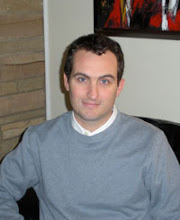This is where I often find my clients. They have come to the realization that their old ways of coping and/or seeing their worlds are no longer working. So, usually with a great amount of resistance (for most of us don't particularly like change), they come to therapy once the consequences are too great to bear.
This is true for the woman who has quietly suffered with anxiety for so long, avoiding this place or that situation, until finally she becomes motivated by her pain and anger. Now aware of the freedom she has lost, she appears in therapy to reclaim her right to an unshackled life. This is true for the man addicted to alcohol, who realizes with great sadness that his drinking is no longer excusable in the face of the impending legal troubles and fractured relationships. This is true for the folks I see lost in their depression, as one day they catch a radiant glimpse that this is not the life that was intended for them. And, the list goes on.
For me, after I read Frankl's book "A Man's Search for Meaning", I was forever changed. In it, he describes in great detail how he mentally overcomes being subjected to the greatest horrors one could imagine. Frankl was a Jewish doctor living in Germany when World War II first began, and it wasn't long until he found himself in one of the nazi death camps. Stripped of everything, with the knowledge that most of his family was dead (wife, dad, mom), Frankl made almost supernatural choices to protect and care for his mind. He realized the nazi guards had control over almost every aspect of his life except for his outlook, his attitude, and his ability to love in the face of torturous, inhumane cruelty.
Frankl clearly could not change his situation. He could only hope that he would one day be freed. So, in the interim time, he marshaled his resourcefulness, his intellect, and his heart, to find out what he could change; and that was himself. He learned how to find meaning in his suffering. He saw how love was a sustaining power greater than the evil which tried to overcome his spirit. He discovered how hope is a bridge to carry one over even the most seemingly impossible circumstances.
Viktor Frankl is a hero of mine. He taught me to focus on what I can control; on what I can change; and how love and purpose are always available to me. In the face of suffering, no matter the depth, I at least have control of how I receive it and respond to it. Other times, I have even more options available than I was previously acknowledging, but the pain often disconnects us from these insights and resources.
In therapy, I work to help others get clarity on what they do and don't have power over. Just this simple exercise can help clients stop fighting pointless battles, and then prioritize what can be affected. Then, the limited life energy they have can be more judiciously used to create meaningful changes to their particular situation.
If we find ourselves trying, for instance, to control others, we are wasting our precious energy. The alternative to this becomes creating healthy boundaries with others, in order to care for ourselves while still remaining loving to them. For my clients overwhelmed by fears or anxieties, it is vital to help them more accurately discern whether these fears are rational or irrational. If they are spending their time and energy being overly prepared for things that will never come to pass, it is obvious they are squandering their life energy fruitlessly. For my clients stuck in depression, we look at what they can do to start the process of asking the depression to leave. This may involve exercise, finally getting closure, sharing the story they have kept hidden for so long, honoring the one they are grieving by returning to a healthy life, and far too many other things to list. These changes are often very personal and specific to their wound, their struggle; and our work is to highlight what will indeed help them find meaning and relief in their sorrow.
The wonderful news is just like Frankl, we all have within us the ability to change. I have witnessed the courage of the wife who finally puts up healthy boundaries with her demeaning husband. I have seen the agoraphobic leave the house, drive themselves to their appointments, find a job, renew their dating life, and ultimately reclaim their place in society. I have watched the shadow of depression slowly melt away, until I get the pleasure of saying goodbye to a client who once felt so hopeless.
And most recently, the joy I was blessed with in reconnecting with a former client, who had suffered for so many years in silence; assured she could never share her heart wrenching story of childhood sexual abuse. She now walked into my office to tell me that after her time in therapy, she had accepted an invitation and courageously spoken her story to a women's group of fellow survivors.
Change is available to us all. Yes, it takes courage. Yes, it takes time. However, the gains made for facing down the things which keep us stuck are innumerable. It is my hope for anyone reading this. The sooner you start, the less time wasted.
